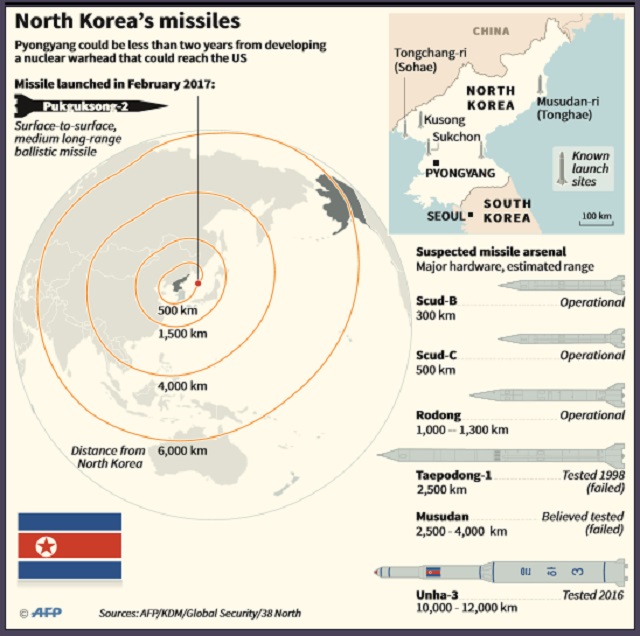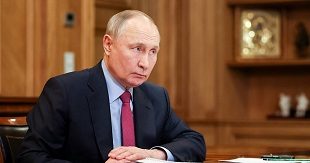
This is one of the reasons why South Korea has not retaliated against any North Korean provocations over the past two decades – even attacks as brazen as the shelling of Yeonpyeong-do and the sinking of South Korean naval corvette Cheonan.
The South Korean capital, Seoul, is acutely vulnerable to North Korean attack because of its proximity to the demilitarised zone. It is virtually indefensible against artillery and missile barrage. Is the Trump administration willing to risk a cascade into full-scale war that would jeopardise the lives of millions of South Koreans in Seoul and its surrounds?
It would be difficult to see the US-South Korea alliance surviving such a disaster – especially if such a crisis was precipitated by a clumsy American intervention.
Such an escalation would be a disaster for the region. Picture the humanitarian tragedy and toxic politics of the Syrian refugee crisis superimposed on Northeast Asia. Does the Trump administration have a plan for managing the regional humanitarian fallout of an escalated war?
This is the nightmare scenario for the Chinese government. It is one of the primary reasons for its continued – though increasingly lukewarm – backing of the Kim regime. It is also why China will inevitably veto any resolution put to the UN Security Council for military action against North Korea.
Why deterrence has prevailed
The idea that a discrete, surgical air strike could be deployed in the Korean context is a mirage. North Korea is not Syria. There is a good reason successive U.S. presidents have settled on deterring North Korea as their default strategy. The menu of possible military options all carry unacceptably high risks.
North Korea has the means to retaliate against targets in South Korea and Japan with conventional weapons, as well as weapons of mass destruction. North Korea’s capacity to attack South Korea has helped preserve a balance of deterrence on the Korean Peninsula since the Korean War armistice in 1953.
While the balance of terror overwhelming favours the U.S, the balance of deterrence in Korea sits at a rough equilibrium. As the more powerful player, the U.S. does not have to act aggressively to maintain this equilibrium and preserve regional stability.
In this context, the threat posed by a nuclear North Korea has been exaggerated through intellectually lazy analysis based on assumptions of the Kim regime’s irrationality. More careful analysis of North Korea’s actual behaviour suggests otherwise.
The overriding priority underpinning North Korean foreign policy remains regime survival and the perpetuation of the Kim family dynasty. To this end, North Korea sees hard military power as the only reliable means of guaranteeing its security in what it perceives as a hostile strategic environment.
North Korea’s nuclear weapons and ballistic missile capabilities are the ultimate practical expressions of this worldview. But, more importantly, they are the North Korean leadership’s only real levers of power internationally.
Trump’s foreign policy team would do well to think through the logic of their escalation. A North Korean first-strike nuclear attack against the U.S. or its regional allies makes little sense for North Korea. From this perspective, it is a strategic restraint on America’s part based on deterrence – rather than unnecessary unilateral muscle-flexing – that’s more likely to preserve regional stability.
Back in 2002, North Korea expert Victor Cha pointed out North Korea was most likely to use nuclear weapons if backed into a corner where the perpetuation of the Kim regime was directly threatened. It is a disturbing irony that by deploying the USS Carl Vinson battle group, Trump has increased the possibility of that scenario coming to pass.
****
Benjamin Habib is a lecturer, School of Social Sciences, La Trobe University in Australia.
****
Source: Theconversation
 The Independent Uganda: You get the Truth we Pay the Price
The Independent Uganda: You get the Truth we Pay the Price



While you point out the risks of confronting North Korea you fail to address the risks of allowing North Korea to continue developing its capabilities. Yes, a US military attack on North Korea could destabilize the region and put many innocent South Koreans in harms way. But the scale of risk is going up. Soon North Korea will be able to effect a much wider population with its threats.
you know this problem with the DPRK is nothing new! When Bill Clinton was in office the head of the snake should have been severed. but it was not. The only thing the Clinton administration did is give them 5 billion dollars! and a nuclear reactor! what kind of fools run this country! boy I miss Roosevelt!
I tell you, If you let north korea keep the nukes they will grow so strong. For sure they will attempt to dominate the world as we know it!!!!!!